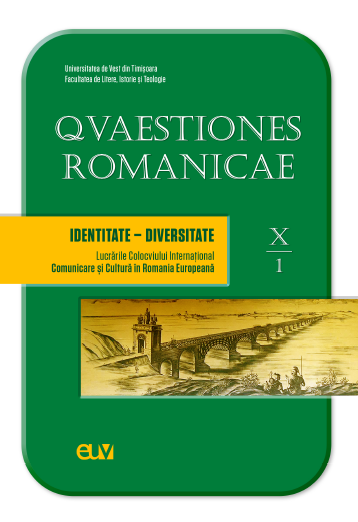Identitate auctorială în Analele lui Tacitus
Abstract: (Authorial Identity in Tacitus’ Annals) The paper examines the lexical and grammatical means through which the authorial identity is expressed in the last work of Tacitus, by investigating mainly the most easily recognizable textual markers: first-person pronouns, pronominal adjectives, and, especially, first-person verbs, which are employed with this role in the Annals more often than pronouns. The analysis takes into account the contexts in which these authorial interventions appear, as well as the functions they perform, thus being able to identify the following situations in which they are used by the historian: to specify his own position regarding the act of writing, the role of the annals, his way of writing history (Tacitus’ best-known statement of this kind is found in the prologue, where he sets himself apart from the other historians of the Julio-Claudian period and concludes: 1.1.3 inde consilium mihi pauca de Augusto et extrema tradere, mox Tiberii principatum et cetera, sine ira et studio, quorum causas procul habeo); to add remarks about past realities and human life; to remind that an information has already been delivered earlier in the work; to give readers a glimpse into the future, with reference either to facts presented later in the Annals, or to historical events posterior to those narrated in the book. Between the past, present, and future, Tacitus constantly reaffirms his authorial identity, the author claiming his place among the great Roman historians.
Keywords: Tacitus, Annals, authorial identity, pronoun, verb.
Rezumat: Comunicarea examinează modul în care este exprimată lexical și gramatical identitatea auctorială în ultima lucrare a lui Tacitus, prin investigarea în principal a celor mai ușor recognoscibile mărci: pronumele și adjectivul pronominal de persoana întâi și, mai ales, verbul la persoana întâi, care este folosit cu acest rol în Anale mai adesea decât pronumele. Analiza urmărește contextele în care apar aceste intervenții auctoriale, precum și funcțiile pe care le îndeplinesc, putându-se identifica următoarele situații în care ele sunt utilizate de istoric: pentru a-și preciza propria poziție în ceea ce privește actul scrierii, rolul analelor, maniera sa de a scrie istorie (cea mai cunoscută dintre afirmațiile lui Tacitus de acest fel se găsește în prolog, unde el se separă de ceilalți istorici ai perioadei iulio-claudiene și conchide: 1.1.3 inde consilium mihi pauca de Augusto et extrema tradere, mox Tiberii principatum et cetera, sine ira et studio, quorum causas procul habeo); pentru a introduce considerații despre realități trecute, despre viața oamenilor; pentru a semnala că o informație a fost deja comunicată anterior în lucrare; pentru a oferi cititorilor priviri spre viitor, cu referire fie la fapte care urmează să fie prezentate în Anale, fie la evenimente istorice viitoare celor pe care își propune să le relateze în această scriere. Între trecut, prezent și viitor, Tacitus își reafirmă constant identitatea auctorială, autorul revendicându-și locul între marii istorici romani.
Cuvinte-cheie: Tacitus, Anale, identitate auctorială, pronume, verb.
